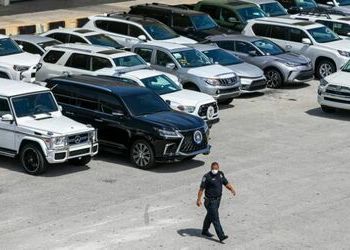The seizure of a fleet of luxury cars in Florida bound for Venezuela has shown how officials and allies of President Nicolás Maduro are still seeking to sidestep US sanctions to develop a range of illicit schemes.
On July 8, US officials announced the seizure of 81 vehicles and displayed them in Port Everglades, the Miami Herald reported. The cars, worth millions, were allegedly part of a complex operation to buy and ship luxury cars to Venezuela, a violation of US export laws and sanctions against the Venezuelan government.
The vehicles had been bought through a “network of straw buyers and shell companies in South Florida…for use by the wealthy, the politically connected and the police” in Venezuela, Homeland Security Investigations (HSI) officials told the newspaper.
SEE ALSO: Venezuela News and Profile
The cars included models from Mercedes-Benz, Jaguar Land Rover and Lexus, among others, with a total estimated sales value of $3.2 million. The most expensive model was a Mercedes Biturbo SUV, costing $150,000.
HSI investigators allege that Raúl Gorrín, a high-profile Venezuelan businessman who is on the US’ Most Wanted List on charges of money laundering, is behind the car smuggling scheme. Neither Gorrín nor anyone else has been charged so far in the federal investigation, and his lawyer later told the Miami Herald that his client “had nothing to do with” the car exports.
These vehicles were likely not the first to be headed to Venezuela.
“This is a drop in the bucket,” HSI Special Agent in Charge Anthony Salisbury told the Miami Herald, suggesting that many cars may have already left from Port Everglades undetected before an investigation was opened by US authorities in April.
“These cars are going down to kleptocrats like Gorrín and his associates to live their billionaire lifestyles,” Salisbury added. “You can’t get your hands on vehicles like these down there.”
Prior to being a fugitive from American justice, Gorrín had established an extensive network of luxury properties in the United States. Due to the money laundering charges against him, federal prosecutors are seeking to seize a portfolio of 20 properties in New York and Florida, including an $8 million mansion in Miami. A Rolls-Royce Phantom worth $200,000 is also being targeted for confiscation.
InSight Crime Analysis
Despite a full-court press by the United States against the Venezuelan administration, networks of shell companies and financial operatives continue to launder millions for the Venezuelan regime in the United States, mostly Florida.
Gorrín was allegedly able to organize shipments of luxury vehicles at Florida’s largest port and likely send them to Venezuela, despite being described by investigators as “one of the largest money launderers in the world.”
In June, after the arrest of Álex Saab, another of Maduro’s top financiers, InSight Crime reported that he had laundered “proceeds of bribes and corruption” in the United States with the help of Bruce Bagley, an organized crime specialist at the University of Miami in Florida.
SEE ALSO: The Fall of Álex Saab, the Venezuelan Regime’s Trusted Money Man
The government of President Donald Trump has kept up the pressure on Venezuela’s government, including an indictment of President Nicolás Maduro, sanctions against his wife and children, arrests of some of his closest allies and any company doing business with the country potentially facing fines.
Since 2017, about $450 million in illicit funds traced back to Venezuela have been seized, along with properties and luxury assets, according to the Miami Herald.
But while these actions have taken their toll on an increasingly cash-strapped Venezuelan administration, schemes such as that run by Gorrín are likely to keep happening as the work of US investigators is at odds with the country’s financial secrecy laws.
According to Transparency International, the United States continues to be “the financial secrecy jurisdiction of choice for many of the world’s corrupt politicians…as it does not make companies disclose their beneficial owners — those who really control and benefit from the companies.”
As a result, the United States ranked second on the Tax Justice Network’s 2020 Financial Secrecy Index, ahead of the likes of Switzerland, the British Virgin Islands and other known tax havens.
This is unlikely to change soon as, in early July, Congress delayed passing the bipartisan Illicit Cash Act, which would likely undo much of this financial secrecy.

